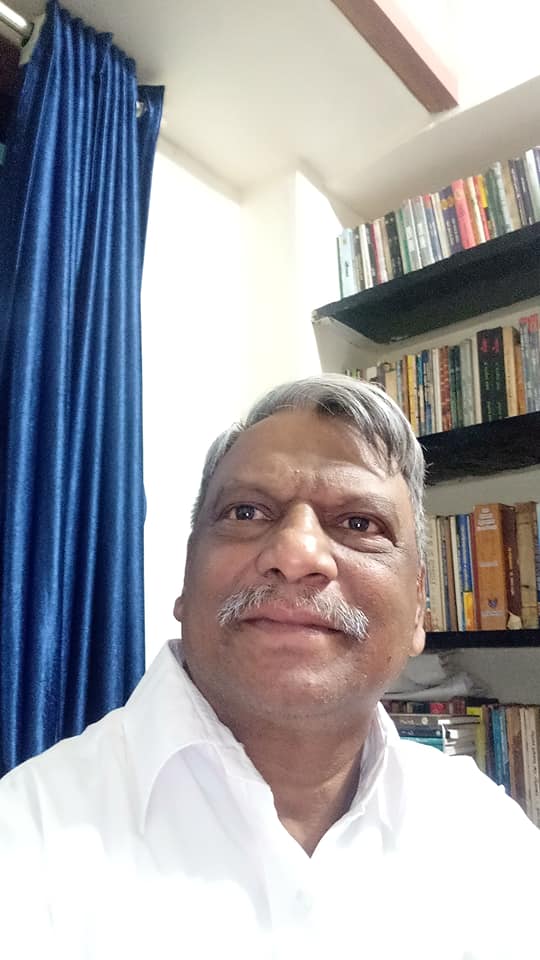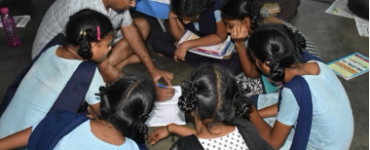A Kannada translation of his work ‘Dalit Sahityache Soundaryashatra’ by Vittalarao Tukaramarao Gaikwad published by Yaji Prakashana, Hosapete received Sahitya Akademi Translation Award 2019. Though he wrote more than 40 books, The 64yr old writer is best known for his autobiography Akkarmashi which is translated in several other Indian languages and in English. And recently I had the privilege of translating his novel ‘Tale of Untouchables’ from English to Telugu which is ready to get published.
Hello sir, hope you are doing great in this pandemic period. How are you spending time at home with literature?
Sharankumar Limbale: In my entire life, I never felt so isolated. This is horrible time for world and human race. On one hand corona is a threat to human race and on the other hand, the clouds of world war are around us . Terrorism, Corruption, Violence and Discrimination in every field of life are becoming fashion of massive power. Corona as well as Violence of State and Majority are our basic problems. We may get vaccine in the coming days for corona but we will not get any medicine in market to treat violence and discrimination against human race. I am doing great but became unhappy and worried thinking about peace and justice. I can’t write and read when the humanity is under threat. I never saw the horrible competition of missiles and atom bombs before. Political powers are exporting weapons instead of food, medicine and modern technology for development. Indian people are not talking about democracy, justice and peace but they are more interested in chanting Jai Shri Ram. Temple is not the issue. Humanity is our issue. The culture built on temples and gods is a big threat for our new generation. I welcome Corona in another way because it proved the uselessness of temples and gods. I am worried about world peace and non violence.
We recently see a lot of translations of your works coming up from different languages of India. How does it feel to be a huge part of Indian literature since long time as a writer and as a Dalit icon?
Limbale yes. Total 50 titles of my translated books are available in various languages. In the coming 3-4 years, 10 to 15 books are forthcoming in translation into many languages. Translation is a cultural bridge. Because of translation of my writing I become part of Indian Dalit literature. Indian literature is nothing but Hindu literature, so called Indian literature never raised its voice against caste violence. It keeps mum and deliberately avoids talking against untouchability and caste system. Hindu religion is built upon caste system. How will Hindu writers dare to write against caste? Caste is their interest and priority. Dalit authors talk against caste in literature, culture and society. Because of the translations, Dalit literature took place against caste literature. In every region and regional language of India, Dalits are awakened and started to express their voice. I became part of Dalits Voice. It becomes possible because of translation. Translation is our need which is uniting deprived classes. The Indian progressive community welcomed our writing and translating our writing. They are also strengthening our movement. As I am a Dalit author I feel proud of my work and its translation. But the main stream literature is ignoring this contribution to Indian literature. In fact we make the real main stream literature. They don’t allow us to assimilate. If I were a high caste author, then the media and main stream would become active to show their wisdom to prove me a great Indian author. Indian mind is a product of caste. How will the main stream or media become an exception? I am happy that I am becoming voice of Indian Dalits and becoming an oddman to so called main stream literature.
As a Marathi, how do you see Buddhism today? Do you think Buddhism shall help one follow and understand Ambedkarism more accurately?
Limbale This is a very complex and difficult question to answer. But yes, there is no doubt about it. The conversion of Dalits of Maharashtra from Hindu to Buddhism is proved as a social revolution. This conversion under the leadership of Dr. Ambedkar became the caste eradication movement among the Marathi Dalits and it gives strong message of equality to the world of Dalits. Dalits from Hindi belt are inspired from this incident of accepting Buddhism. Honestly I feel this is not the ultimate way to end caste system because even after conversion, atrocities on Neo-Buddhists are not stopped. And still many Dalits did not convert from Hindu Religion to Buddhism. Dalits are in all religions, in all regions, in all Sates and all over the world. Dalits are in Hindus, Christians, Muslims, Sikhs and Buddhists. Dalits are in India and out of India. Can anyone tell me how can we unite all Dalits in one single religion, one single region, one single language and one single culture? We are living in democracy. In Maharashtra, the Budhism became a way of life for Dalits. It changed the faith and future of Modern Marathi Dalits. I never felt that the Dalit Buddhism is a separate philosophy. It’s an integral part of Ambedkarism. It proves as a tool of social change among Dalits.
I have translated your novel ‘Tale of untouchables’ recently which portrayed Marathi culture especially from the rural and remote villages like Palasdev, Khimgav. The novel shows how Dalits are treated from different perspectives. Tell us the experiences in writing down this novel.
Limbale I have written 8 novels so far. Three of them translated into English. ‘Hindu’ by Samya Publication, Kolkata, ‘Tale of Untouchables’ by Authors Press, Delhi, and ‘Smouldering Horizons’ by South Asia Press, Delhi. Two novels are under translation in English. You are talking about my novel “Tale of Untouchables”. First of all I want to congratulate to you for translating my novel in Telugu and thanks for sparing your valuable time for translating my work. In each and every novel I try to do some experiments. In this novel I used a popular style of writing. You will see in the plot of the novel -Rape, Murder and Mystery which is used very effectively to tell the story of Dalits. This writing is not for entertainment but to provoke the readers against the injustice. This is a unique style to tell the story of Dalits by Higher Castes.
What are your insights on Indian translations? How far do you think can the translator take liberty in localising the original content into her/his language and culture?
Limbale Indian translations are in “class room teaching languages.” Mainly translators are from High Castes. They don’t know Dalit Culture, Consciousness and Languages. All translations of Dalit texts are in Standard Languages. But original Dalit work is not in Standard Language. It’s ok. I think the translated language is not important but the content of the Dalit text, the commitment of the Dalit author, his powerful thought against injustice and his honest tone should be appeared in translated work. When it became necessary for translator to tell the story effectively in his language then he localises the original work. But he should not deviate from the original work diluting the Dalit author’s tone. The translation is a recreation of the original work with honesty. Localising the translation should enrich the original work. But that doesn’t happen. When there is difficulty to translate the original work, then the translators are taking liberty to localise the original work. This is fraud and not an honest job.
Can you share the experience of any new literature that you read recently?
Limbale My reading is very limited. Because of the globalisation, we are getting world literature easily. Translation of world literature and Indian literature is becoming new stream in literature. Today translated works are been increased in huge number. It shapes our taste and vision looking towards literature. Here I like to talk about new Dalit Writer’s works. New generation of Dalit writers are writing about their new look and experience. Their style, way of expression and approach towards the new world of experience is unique. From Hindi Ajay Navriya, Tamil Meena Kandaswami, Malayalam A R Renukumar, Telugu Manasa Yendluri are adding their voices to change the Dalit literature world.
As a senior international writer, can you suggest the young writers how to sustain the art of writing for long time?
Limbale This is difficult to say. Every writer is born out of their own interests. A writer cannot be made. But new writers if they want to improve their strength, they should read new writings from different languages instead of reading only classics. World and Society are changing very fast. This change and speed cannot be ignored.
Tell us about your favorite writers and their works that might have influenced you?
Limbale I am inspired by writings of Dr. Babasaheb Ambedkar. If he was not there Im not here. Karl Marx and his writings also inspired me. The progressive writer’s movement helped me to find a way in writing. I loved Mass Movements and struggle of people than any book. I am an activist writer. My words are weapons. I stand for Liberty, Equality and Fraternity. I love Democracy.
Lastly, my Father Prof. Yendluri Sudhakar had translated few parts of your autobiography ‘Akkarmaashi’ from Hindi to Telugu in 1999 and after 20 years in 2019 his daughter, I translated your novel lately. How exciting was it to see our translations being done by two generations?
Limbale Geeta Ramaswami, publisher of Hyderabad Book Trust told me that Sudhakar Yendluri is translating my book Akkarmashi. I was very happy and felt proud. Sudhakar Yendluri is a big name and he translated which makes me excited even today. The whole work was not translated by him because of his busy schedule. But he has shown his interest and worked on my book. This was a great moment for me. I met him in Guntur, Dalit Literature Festival. I personally saw how Telugu people loved him and his literature. I saw his long procession lead by people. He is a hero of Telugu Dalit Literature. And you are our dream. You are a big fiction writer now. I am happy that I have this attachment with the Yendluri family.
*









Sharankumar Limbale ji , I appreciate your straight forward thinking and writing.
In this interview, You have expressed thinking of many more like minded people.
Wish you Good luck and all the success, of course you definitely Deserve for.Take care.
Regards.
NaaM Shinde, Mumbai.
Wonderful Amazing and spelender ideas of Mr. Limbale he. Is dynamic and versatile personality in the field of Dalit writing . He is phenomenal and unique eminent scholar in the post modern society. He always talks on liberty equality and fraternity . I wish he may have good health and prosperity ever.